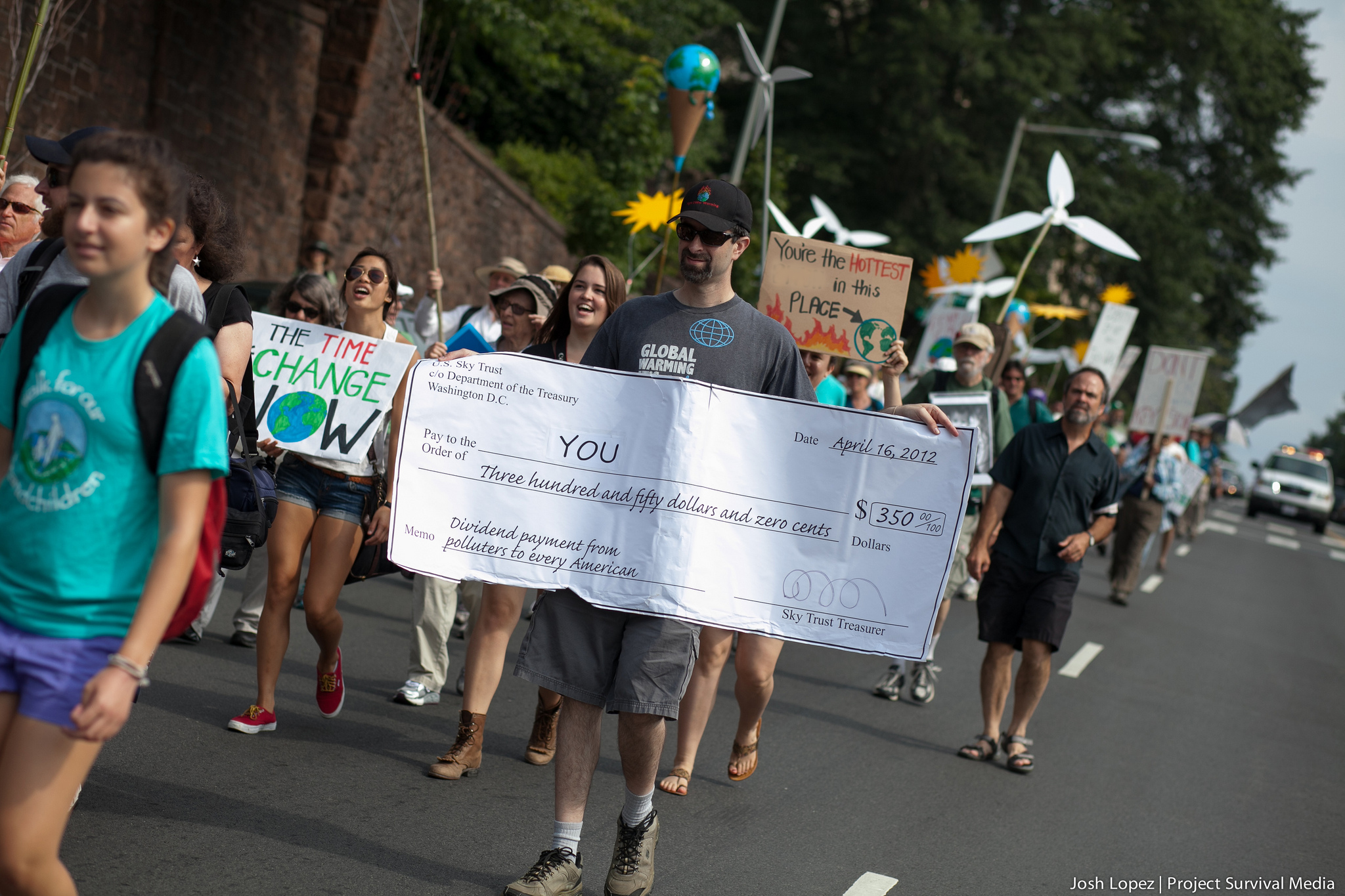The following is a guest post by April Moore, a Virginia-based author and climate activist, cross-posted from her blog, the Earth Connection.
I am excited to tell you about the best approach I’ve heard yet for dealing with our climate crisis. It’s a solution that brings greenhouse gas emissions down to very low levels, while also putting money in the pockets of most Americans. Doesn’t that sound good?
The solution is a truly landmark piece of legislation, the Healthy Climate and Family Security Act, which has just been introduced into the U.S. House of Representatives by Chris Van Hollen of Maryland.
Now before you assume that no comprehensive climate solution bill can pass in today’s dysfunctional Congress, let me tell you some basics about the bill that should appeal to practically everyone.
This is a simple, fair, and ‘built-to-last’ solution. Over time, it reduces greenhouse gas emissions to 80% below 2005 levels, which is what scientists say is needed if we are to avert the worst climate outcomes. And, at the same time, it directly benefits all Americans in the form of quarterly payments or dividends.
The Act puts a tightening cap on carbon emissions – 20% below 2005 levels by 2020; 40% lower by 2030; and 80% lower by 2050. Companies that mine or import coal, oil, or natural gas will be required to purchase pollution permits at auction. These 2,500 or so companies must buy a permit for every ton of carbon dioxide, or CO2, those fuels would emit once introduced into the U.S. economy. The companies will buy these permits at auctions organized by the U.S. Treasury. Over the first 10 years of the Act’s implementation, more than $500 billion would be raised.
But this is not a big government solution. ALL of the money raised from the permits purchased will be paid out to the American public, with a check mailed, every three months, to every U.S. resident with a Social Security number. It is expected that the median income family of four will receive a net benefit of $260 per year at the beginning of the program. And that benefit will grow over time, as the fossil fuels cap tightens and the United States transitions away from fossil fuels and toward a clean energy economy.
In rebating the money equally to all Americans, the Act benefits middle and lower income Americans more than it benefits the richest. Since the companies buying the emission permits will pass their costs on to the public, in the form of higher gasoline and other prices, the quarterly checks to citizens will cover far more of middle and lower income Americans’ spending on carbon-producing activities than it will cover of the carbon-producing activities of the wealthy. After all, the wealthy tend live in ways that result in a greater carbon footprint than do the rest of us.
The bill includes needed flexibility on reduction targets. If subsequent science-based evidence shows greater reductions are needed, the bill states that carbon reduction targets and schedules can “be revised by Congress in order to avert catastrophic climate impacts.” The bill also protects American companies from unfair competition from the companies of countries that are not subject to such required emission permit purchases.
The bill also explicitly prohibits big banks and Wall Street traders from buying or selling the emission permits. Companies are not allowed the option of planting trees or taking other ‘offsetting’ actions in lieu of buying the emission permits.
Surely, this bill will be wildly popular with the public, once they understand it. After all, Alaska has paid out more than $17 billion in dividends from oil royalties to all Alaskan citizens since 1982. That’s when then-Governor Republican Jay Hammond established the Alaska Permanent Fund, maintaining that the state’s natural wealth belongs to all its people. Not surprisingly, the Permanent Fund is extremely popular among Alaskans.
I hear from Hill-savvy climate activists that many Republicans in Congress now take the climate crisis seriously and are looking for a face-saving way to speak out. I pray that the Healthy Climate and Family Security Act will be that way. After all, it is not a tax but more of a tax cut. It would return billions of dollars from government to the people.
In any event, it’s up to us, the people, to make sure our Congress does the right thing. Even in our diminished democracy, if our elected representatives hear from their constituents, in no uncertain terms, that we want this legislation, they will have to act if they want to stay in office. Here’s what you can do to help make the Healthy Climate and Family Security Act a reality:
- Sign a petition to Congress, calling for the passage of the Healthy Climate and Family Security Act. Sign the petition.
- Read the bill. Unlike may pieces of legislation that are hundreds of pages long, the Healthy Climate and Family Security Act is a lean 28 pages. By reading it, you will be better able to spread the word to others. Read the bill.
- Tell others about the Healthy Climate and Family Security Act, especially those who believe there is nothing we can do about the climate crisis.
- Gather a small group of people who support the bill, and make an appointment to meet with your Member of Congress next time s/he is in the District. Tell your Representative how important the legislation is to all of us and to our country’s future, that you want him/her to support it. Tell the local press about the results of your meeting, or even bring a local reporter to the meeting with you.
Together, we can–and must–win this!
